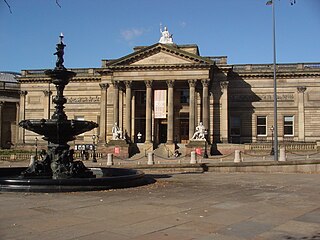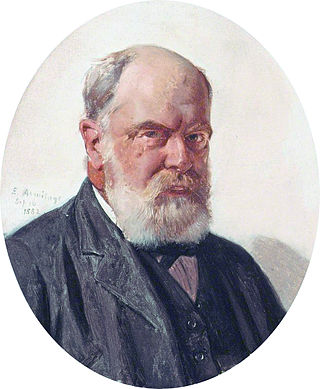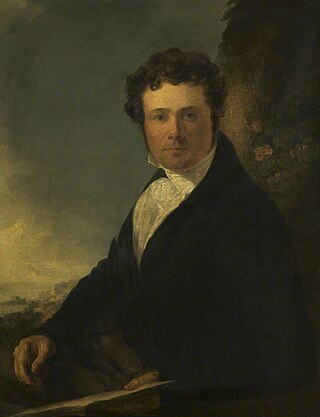Related Research Articles

Frederic Leighton, 1st Baron Leighton,, known as Sir Frederic Leighton between 1878 and 1896, was a British Victorian painter, draughtsman, and sculptor. His works depicted historical, biblical, and classical subject matter in an academic style. His paintings were enormously popular and expensive, during his lifetime, but fell out of critical favour for many decades in the early 20th century.

The Walker Art Gallery is an art gallery in Liverpool, which houses one of the largest art collections in England outside London. It is part of the National Museums Liverpool group.
Thomas Seddon was an English landscape painter associated with the Pre-Raphaelite movement, who painted colourful and highly detailed scenes of Brittany, Egypt, and Jerusalem.

The Royal Scottish Academy (RSA) is the country’s national academy of art. It promotes contemporary Scottish art.

The Pennsylvania Academy of the Fine Arts (PAFA) is a museum and private art school in Philadelphia, Pennsylvania. It was founded in 1805 and is the first and oldest art museum and art school in the United States.

The Royal Manchester Institution (RMI) was an English learned society founded on 1 October 1823 at a public meeting held in the Exchange Room by Manchester merchants, local artists and others keen to dispel the image of Manchester as a city lacking in culture and taste.

Edward Armitage was an English Victorian-era painter whose work focused on historical, classical and biblical subjects.

George Wallis (1811–1891) was an artist, museum curator and art educator. He was the first Keeper of Fine Art Collection at South Kensington Museum in London.

Lewis Fry was a Quaker, lawyer, philanthropist and a Liberal and later Liberal and Unionist politician who sat in the House of Commons in three spells between 1878 and 1900.

Edmund George Lind was an English-born American architect, active in Baltimore, Atlanta, and the American south.

The Society of Women Artists (SWA) is a British art body dedicated to celebrating and promoting fine art created by women. It was founded as the Society of Female Artists (SFA) in 1855, offering women artists the opportunity to exhibit and sell their works. Annual exhibitions have been held in London since 1857, with some wartime interruptions.

Andrew McCullum was a British landscape painter.

George Cole was an English painter known for his landscapes and animal paintings.
Henry James Johnstone (1835–1907) was a leading portrait photographer in Melbourne, Victoria, Australia during the 1870s and 1880s, and also a prominent artist.

The British explorer and Arabist Sir Richard Francis Burton (1821–1890) published over 40 books and countless articles, monographs and letters. Most of Burton's books are travel narratives or translations. His only works of original imaginative fiction are both in verse: Stone Talk (1865) and the well-known The Kasidah (1880), both of which he published under the pseudonym "Frank Baker".

Barnett Samuel Marks R.C.A. was a Welsh-Jewish portrait painter who was also noted for his social realism paintings.
Walter Severn, professionally a civil servant, was known as an English water-colour artist.

William John Seward Webber was an English sculptor who created civic statuary, and busts of national heroes and local worthies, in marble. He sculpted the statue of Queen Victoria for the Jubilee Monument in Harrogate, North Riding of Yorkshire, England in 1887. An early success was his Warrior and Wounded Youth group of 1878, executed while he was still a student. His busts include portraits of the Duke of Clarence, John Charles Dollman, Henry Phillpotts, John Bowring, John Ruskin, Richard Jefferies, Alfred, Lord Tennyson, Charles Darwin, Walter Scott, Thomas Carlyle, Robert Burns and Thomas Holroyd.

James Parry was a British painter and engraver.
References
- 1 2 3 Ottley, Henry (March 15, 1862). "Society for the Encouragement of the Fine Arts". The Musical World . 40 (11): 165.
- 1 2 Walford, Edward (1878). "Chapter 24: Hanover Square and its neighbourhood". Old and New London. Vol. 4. Cassell. pp. 314–326. Retrieved 2010-04-12.
- ↑ Carter, Albert Charles Robinson (1911). . In Chisholm, Hugh (ed.). Encyclopædia Britannica . Vol. 02 (11th ed.). Cambridge University Press. pp. 701–703, see page 702.
- ↑ The Antiquarian (1871, pp82)
- ↑ The Times , Friday, Jan 24, 1873; pg. 12; Issue 27595; col D
- ↑ Who's Who (2010)
- ↑ The Times, Wednesday, Mar 01, 1882; pg. 6; Issue 30443; col G
- ↑ Joanna Meacock (2006). "The Exhibition Society". Exhibition Culture in 19th Century London 1878-1908, University of Glasgow.
- ↑ "The Society for the Encouragement of the Fine Arts". The Year's Art (19): 126. 1898.